MercoPress. South Atlantic News Agency
Tag: Argentine GDP
-
Monday, August 29th 2016 - 03:59 UTC
Court ruling and economy contraction push Argentine inflation down in August

Inflation in Argentina during the current month of August could drop to 0.7% because of the Supreme Court’s decision to strike down the hikes in natural gas prices for residential users, according to the official stats office Indec. Similar stats also indicate a strong contraction of the Argentine economy.
-
Monday, June 27th 2016 - 07:15 UTC
Brazil's recession greater risk than Brexit for Argentina: could chip 1.5 percentage points from GDP
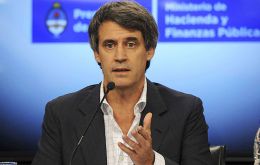
Argentina’s annual rate of inflation was likely to have reached an annualized 42% through May, but should begin to slow in June with a return to growth also on the horizon, Finance Minister Alfonso Prat-Gay said in an address to investors in New York. The minister also said that for Argentina, Brazil's recession had a greater impact than Brexit.
-
Friday, April 29th 2016 - 06:08 UTC
IMF praises Argentina's new focus despite an expected contraction of 1% this year
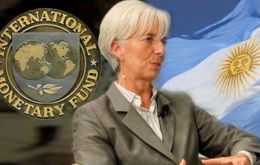
Argentina's GDP is expected to contract by about 1% in 2016, according to the latest IMF Regional Economic Outlook; Western Hemisphere, announced on Wednesday in Mexico. The chapter on Argentina makes a special mention of the new government's changes to remove macroeconomic imbalances.
-
Thursday, January 14th 2016 - 06:42 UTC
Argentina targets 25% inflation and fiscal deficit of 4.8% of GDP this year

Argentina Finance Minister Alfonso Prat Gay revealed on Wednesday that the fiscal deficit registered in 2015 was of 5.8% of GDP and 7.1% of GDP is all debts are computed, and complained that “there has been wasteful spending and when there is an expense it’s not well done.”
-
Friday, December 18th 2015 - 09:14 UTC
Argentine minister 'satisfied' with the market response on first day without the dollar clamp
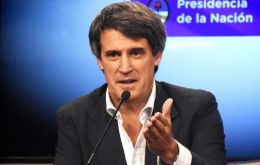
Argentina's Finance Minister Alfonso Prat Gay said on Thursday that the first day in the market without the dollar restrictions imposed by the previous administration, had been positive and as they had planned or expected. Compared to the previous multi-tier system, the dollar appreciated in the range of 25% against the Peso in the unified market.
-
Friday, November 27th 2015 - 07:55 UTC
Brazilian banks follow closely events in Argentina: Dollar at 12 Pesos

Brazilian banks which follow closely events in Argentina and prospects of the new government under president Mauricio Macri, believe the official exchange rate of 9.67 Pesos to the dollar will inevitably have to be devalued, to 12 Pesos by the end of the year, which means a 24% depreciation.
-
Thursday, November 19th 2015 - 07:55 UTC
Argentina's fiscal deficit 3.5% of GDP, says minister Kicillof

Argentina will likely end the year with a fiscal deficit of 3.5% of GDP, Economy Minister Axel Kicillof said on Wednesday, rejecting estimates by the opposition for a deficit around twice as high.
-
Saturday, July 25th 2015 - 05:24 UTC
Economic activity in Argentina picking up, according to Indec
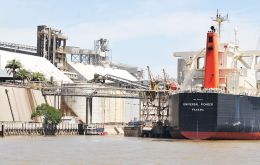
Economic activity in Argentina has increased 2.2% in May, compared to the same month of 2014, according to the country's stats office, Indec. Compared to April this year, economic activity has grown 0.8%, the Monthly Economic Activity Index revealed.
-
Friday, June 12th 2015 - 06:02 UTC
World Bank forecasts Argentina will regain access to capital markets in 2017

The World Bank is optimistic about the outlook for the Argentine economy, predicting the country’s GDP will grow 1.1% this year, a considerable upgrade from the decline of 0.3% it expected in January, and perhaps even stronger growth of 1.8% in 2016 and of 3% points in 2017, thanks to a “stronger” macroeconomic environment and “regained” access to international capital markets.
-
Friday, May 1st 2015 - 06:44 UTC
Leading Argentine economist says that we must admit “IMF is incorrigible”
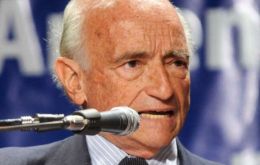
Economist Aldo Ferrer has said the International Monetary Fund (IMF) was “incorrigible”, questioning the report the multilateral credit organism released this week saying Argentina should devalue on its peso currency and carry out austerity policies to get back on the track of growth.
